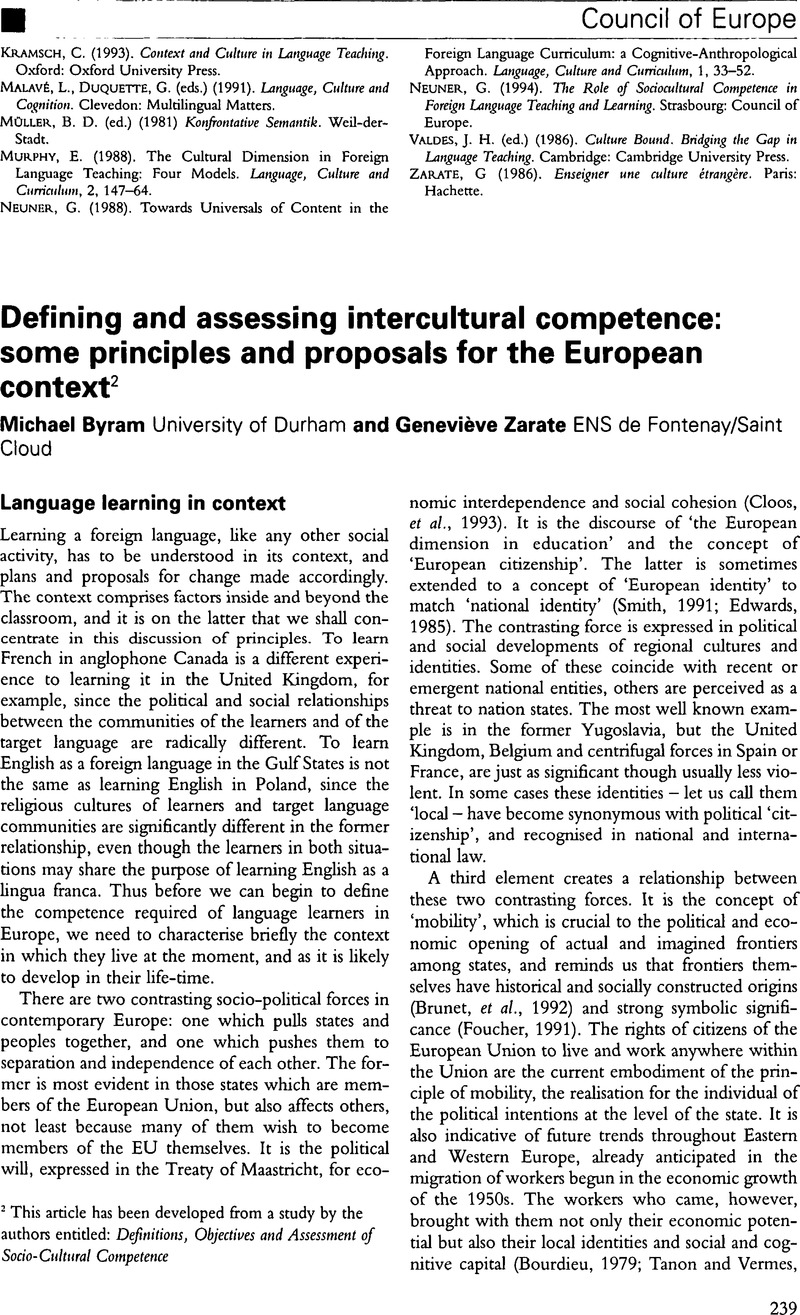Crossref Citations
This article has been cited by the following publications. This list is generated based on data provided by Crossref.
Zapata, Gabriela C.
2005.
Literature in L2 Spanish Classes: An Examination of Focus-on-Cultural Understanding.
Language Awareness,
Vol. 14,
Issue. 4,
p.
261.
Sercu, Lies
2006.
Foreign Language Teachers and Intercultural Competence Teaching. Are they in Favour or Against It? Results from an International Investigation.
ITL - International Journal of Applied Linguistics,
Vol. 151,
Issue. ,
p.
15.
강대민
2009.
The Construction of Intercultural Knowledge in a Korean High School EFL Classroom.
English Language and Linguistics,
Vol. null,
Issue. 28,
p.
157.
Bruen, Jennifer
Péchenart, Juliette
and
Crosbie, Veronica
2010.
Critical Design and Effective Tools for E-Learning in Higher Education.
p.
176.
Driscoll, Patricia
Rowe, Janet Elizabeth
and
Thomae, Manuela
2014.
The sustainable impact of a short comparative teaching placement abroad on primary school language teachers’ professional, linguistic and cultural skills.
The Language Learning Journal,
Vol. 42,
Issue. 3,
p.
307.
Byram, Michael
2014.
Twenty-five years on – from cultural studies to intercultural citizenship.
Language, Culture and Curriculum,
Vol. 27,
Issue. 3,
p.
209.
Lindner, Rachel
and
Méndez Garcia, Maria del Carmen
2014.
The Autobiography of Intercultural Encounters through Visual Media: exploring images of others in telecollaboration.
Language, Culture and Curriculum,
Vol. 27,
Issue. 3,
p.
226.
FERYOK, ANNE
and
ORANJE, JO
2015.
Adopting a Cultural Portfolio Project in Teaching German as a Foreign Language: Language Teacher Cognition as a Dynamic System.
The Modern Language Journal,
Vol. 99,
Issue. 3,
p.
546.
Moloney, Robyn
Harbon, Lesley
and
Fielding, Ruth
2016.
Intercultural Competence in Education.
p.
185.
Giovanangeli, Angela
and
Oguro, Susan
2016.
Cultural Responsiveness: a framework for re-thinking students’ interculturality through study abroad.
Intercultural Education,
Vol. 27,
Issue. 1,
p.
70.
2016.
Chen, Hsin-I
2017.
Intercultural communication in online social networking discourse.
Language and Intercultural Communication,
Vol. 17,
Issue. 2,
p.
166.
Strugielska, Ariadna
and
Piątkowska, Katarzyna
2017.
Turning Constructionist Intercultural Communicative Competence and Complex Systems Theory into Praxis.
Journal of Intercultural Communication,
Vol. 17,
Issue. 1,
p.
1.
Gong, Yang
Hu, Xiang
and
Lai, Chun
2018.
Chinese as a second language teachers’ cognition in teaching intercultural communicative competence.
System,
Vol. 78,
Issue. ,
p.
224.
Orsini-Jones, Marina
and
Lee, Fiona
2018.
Intercultural Communicative Competence for Global Citizenship.
p.
7.
Byram, Michael
and
Wagner, Manuela
2018.
Making a difference: Language teaching for intercultural and international dialogue.
Foreign Language Annals,
Vol. 51,
Issue. 1,
p.
140.
de Leão, Ana Ponce
2018.
Interculturality in English Language Teaching – A Small Study with Portuguese Teachers.
e-TEALS,
Vol. 8,
Issue. 1,
p.
107.
Zheng, Xuan
and
Gao, Yihong
2019.
Second Handbook of English Language Teaching.
p.
1.
Toprak Yıldız, Tuğba Elif
2019.
Addressing intercultural competence in BELF (English as a lingua franca in business) contexts.
RumeliDE Dil ve Edebiyat Araştırmaları Dergisi,
p.
429.
Lee, Seung Chun
2019.
Integrating entertainment and critical pedagogy for multicultural pre-service teachers: film watching during the lecture hours of higher education.
Intercultural Education,
Vol. 30,
Issue. 2,
p.
107.


